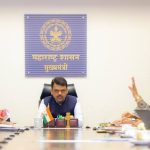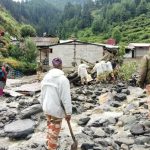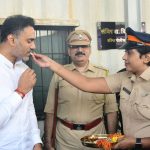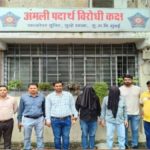By | Arvind Jadhav | Political News
New Delhi: A select group of Opposition leaders held a closed-door meeting to discuss the upcoming Vice-Presidential election. The meeting was attended by prominent leaders, including Congress’s Sonia Gandhi, Mallikarjun Kharge, Rahul Gandhi, and leaders from other parties such as Trinamool Congress, Samajwadi Party, and Nationalist Congress Party. The meeting aimed to discuss strategies and potential candidates for the election. The Opposition parties are keen to field a strong candidate who can challenge the BJP’s nominee. The leaders emphasized the need for unity and coordination among Opposition parties. The meeting was a crucial step in determining the Opposition’s approach to the Vice-Presidential election. The leaders discussed various aspects of the election, including the nomination process and campaign strategy. The Opposition parties are determined to make a strong showing in the election. The meeting ended with a clear understanding of the challenges ahead. The Opposition parties are gearing up for a tough contest.
The leaders discussed the need to decide on a candidate after seeing who the BJP nominates. They emphasized the importance of choosing a candidate who embodies the ideological contest to save the Constitution, which they believe is under assault by the current government. The Opposition parties want to ensure that their candidate can rally support and challenge the BJP’s nominee effectively. The leaders stressed the need for a strong and united Opposition to take on the BJP. The discussion highlighted the importance of selecting a candidate who can appeal to a broad range of voters. The Opposition parties are keen to avoid internal conflicts and present a united front. The leaders are carefully considering their options and weighing the pros and cons of different candidates. The meeting showed that the Opposition parties are serious about contesting the election. The leaders are determined to make a strong impact on the election. The discussion was productive and laid the groundwork for future decisions.
The Election Commission of India (ECI) has notified the Vice-Presidential election, and the nomination process has begun. This development has set the stage for a potentially contentious election. The ECI’s notification has triggered a flurry of activity among political parties. The Opposition parties are gearing up for a tough contest, and the BJP is expected to nominate a strong candidate. The nomination process is a critical aspect of the election, and parties are carefully selecting their candidates. The ECI has outlined the rules and procedures for the election, and parties must adhere to these guidelines. The election is expected to be closely contested, with both sides vying for support. The outcome of the election will have significant implications for the country. The ECI’s role in ensuring a free and fair election is crucial. The notification has marked the beginning of a new phase in the election process.
The Opposition parties are likely to field a candidate who can rally support against the BJP’s nominee. The meeting highlighted the importance of unity among Opposition parties in selecting a strong candidate who can challenge the BJP’s candidate. The Opposition parties are determined to present a united front and avoid internal conflicts. The leaders are working together to develop a strategy that can help them win the election. The Opposition parties are keen to capitalize on any weaknesses in the BJP’s candidate. The meeting showed that the Opposition parties are serious about contesting the election. The leaders are carefully considering their options and developing a strategy to win the election. The Opposition parties are confident that they can make a strong showing in the election. The meeting laid the groundwork for future decisions and actions. The Opposition parties are gearing up for a tough contest.
During the meeting, some leaders also raised other issues, including vacant seats in the State Assembly that were yet to be filled. Additionally, there was a discussion about protesting Lt.-Governor Manoj Sinha’s orders to ban books. The leaders expressed concern about the impact of these issues on the state’s governance and democracy. The meeting highlighted the need for the Opposition parties to stay focused on key issues. The leaders are determined to hold the government accountable for its actions. The discussion showed that the Opposition parties are committed to fighting for the rights of citizens. The meeting touched on various aspects of governance and democracy. The leaders emphasized the importance of transparency and accountability in government. The Opposition parties are keen to ensure that the government is working in the best interests of citizens. The discussion was productive and highlighted the Opposition’s commitment to good governance.






